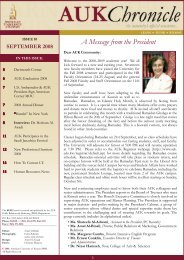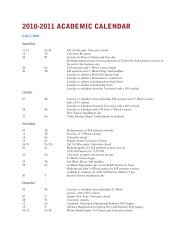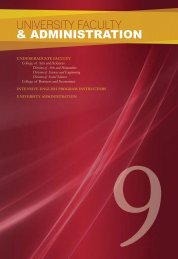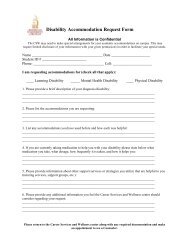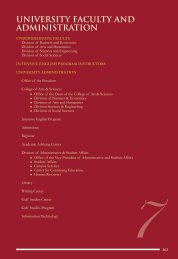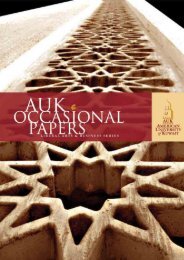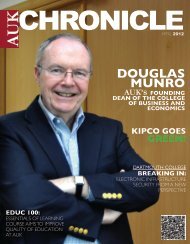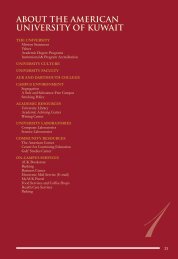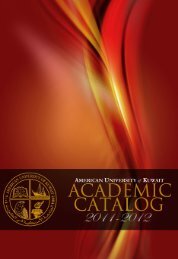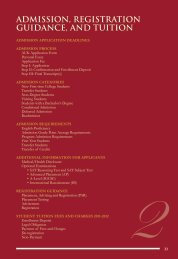higher education is distinguished by co-existenceof Liberal Arts colleges alongside the large researchuniversities. The liberal-arts college model presentsa special challenge in the Gulf region. Liberal Artscolleges in the United States are noted for producinga disproportionately high share of graduate studentsand advanced-degree holders in non-Liberal Artsfields. In the Middle East, and especially in theGulf countries, the concept of liberal-arts educationis truly foreign. It is poorly understood, frequentlymisinterpreted, and virtually untranslatable as aterm standing for a certain philosophy of universityeducation. Even such a basic systemic aspect ofliberal education as putting a scholar-teacher in theclassroom is not readily understood abroad. Liberaleducation is routinely perceived as concomitant withdisregard for research among the faculty and lackof serious professional preparation for students.Currently, American University of Kuwait is theonly institution in the Gulf expressly committedto the liberal-arts mission of college education. Aprivate, Kuwaiti-owned university, <strong>AUK</strong> integratesthe liberal-arts curriculum in all its degree programs,including the Bachelor of Arts, Bachelor of Science,and Bachelor of Business Administration.The concept of liberal education as a career-buildingfoundation in the sciences, business andentrepreneurship invites a broad intellectual exchange,and this is our primary motivation for developing atradition of academic conferences centered on theconcept of Liberal Arts education in the 21 st century.As we all know, education is about more than subjects,disciplines, and a curriculum; life is not divided into“majors.” Our programs are designed to preparestudents for the contemporary world where criticalthinking, communication skills, and life-long learninghave become imperative. The very transferability ofliberal-arts skills has become a “selling” point foremployers of liberal-arts graduates. These skills,variously named and numbered by the experts,include interpersonal and team-working skills,written and oral communication skills, adaptability tochange, problem-solving skills, and critical, analytical,and creative thinking.In Kuwait and the Middle East, we struggle to makethe concept of Liberal Arts understood, despite thewonderful heritage of medieval Islamic science andphilosophy. The Liberal Arts in the Western traditionwere based on Classical philosophy and the earlydisciplines that shaped the education from Antiquityto the Enlightenment. Strikingly, the ancient Greekterm that was translated by the Romans as “art,”was techne, meaning “skill” rather than “art” in ourcontemporary understanding. Technai eleuteries meantthe “liberal arts” in the sense of knowledge andintellectual qualities required of a Greek citizen inthe age of Athenian democracy. In Rome, and thenin medieval Europe, “Liberal Arts” came to mean thebroad education in a whole range of knowledge notlimited to a certain profession or craft, an educationthat enables a person to gain competency in variousfields and develop a civic consciousness and informedhabits of thought. The usual translation of “LiberalArts” into Arabic as “funoon hurra” (from fann “art”),although correct etymologically, carries for themodern student confusing implications of Fine Arts,of art as craft, or even of science as technique. TheArabic word aadaab, the plural of the singular adab,usually translated as “literature,” fully corresponds tothe plural “Letters” in the phrase al-funoon wa-’l-aadaab“Arts and Letters” or in al-adaab wa-l’-`uloom, “Artsand Sciences.” The phrase “aadaab hurra” for “LiberalArts” better conveys the social and intellectual aspectsof reflective knowledge, of enlightened judgment,and of educated and cultivated qualities required formeaningful participation in society. Still, it appearsto omit the science-education element so oftenoverlooked in interpretations of liberal education.The educational breadth may be better conveyed byusing diraasaat hurra or diraasaat faseeha, another choicefor scholars and native speakers of Arabic to ponder.This interpretive challenge is an important reminder ofthe intellectual complexities faced daily by academicsworking in multi-cultural contexts and environments.In the race for developing the national professionalclasses, rather than building integrated colleges ofArts and Sciences, Gulf countries have often chosento import selected professional programs fromdistinguished American universities. U.S. institutionsare encouraged or invited to bring to the Gulfbusiness, professional or pre-professional programs(with few exceptions, these are undergraduate). Inaffirming <strong>AUK</strong>’s commitment to the Liberal Artsmission, we often argue that the learning skillsdeveloped through liberal education sometimes arevalued by faculty and employers alike over narrowprofessional knowledge.3
4However, it is important to emphasize that theargument for Liberal Arts does not constitute anargument against professional knowledge. Rather,we aim to avoid narrow-field knowledge and trainingin favor of broad-based knowledge of a full rangeof disciplines. Without knowledge and informedacquaintance with many areas of study, analyticaland critical thinking may descend to the level ofuninformed opinion or biased attitude – occasionallysupported by manipulation of words, numbers orimages -- rather than balanced analysis of facts incontext. By using critical thinking, students learnto examine and evaluate evidence and to distinguishbetween argument, opinion, and fact. They “learnto identify assumptions, evaluate evidence, to reasoncorrectly, and to take responsibility for the conclusionsthat result”.* [*Grinnell College Catalog, ”Education in theLiberal Arts,” at http://www.grinnell.edu/academic/catalog/education/ ].Numerous studies have demonstrated the career-buildingpotential of Liberal-Arts education among Americanand international leaders of the industry, business,and governments.The magazine Business Week reports that chiefexecutives are quick, creative learners who embracechange. We recognize those qualities as the products ofa broadly based liberal education. Yet here in Kuwait,we hear apprehensive predictions that American-modelliberal education will produce unemployed liberal-artsgraduates. Such fears are not totally alien to theUnited States public opinion. In response, W.R.Connor, president of Teagle Foundation and formerpresident of the National Humanities Center, writes:“The greatest problem confronting the liberalarts is not a glut of graduates possessing thesequalities, but the difficulties of developing themmore fully at every stage of education. In that effortwe have perhaps more allies than we might think,including those outside academic who know howmuch they are needed in our society today. Just aswar is too important to be left to the generals, sothe liberal arts cannot be the exclusive prerogativeof those of us in academia. Thoughtful, committedpeople from outside academia – we all know some ofthem – can help keep us focused on the importanceof these skills of freedom in this time of radical,unpredictable change.”[* W.R. Connor, “Liberal Arts Education in theTwenty-First century.” AALE <strong>Occasional</strong> <strong>Papers</strong> inLiberal Education #2 (Chapel Hill, NC: AmericanAcademy for Liberal Education, 2000, p.8).]<strong>AUK</strong> faculty work hard to create a caring environmentwhere every aspect of students’ development getsattention and support. To achieve positive studentlearning outcomes, our faculty incorporate a wide rangeof educational practices into classroom instructionand mentoring. Moreover, our liberal-arts-orientededucational mission calls for a positive connectionbetween teaching and scholarly activity. <strong>AUK</strong> LiberalArts conferences provide a forum for our internationalfaculty to share their expertise and brings to theuniversity their experience and wisdom and theirpassion for educating students “broadly and liberally.”For successful implementation of the Americanmodel in non-American environment, educatorsand higher-education authorities need to be clearabout the salient features of existing local systemsof education, the salient features of American highereducation, where the gaps and differences are andhow they impact the outcomes. <strong>AUK</strong> has taken thelead in developing an international dialog on thesubject of Liberal Arts, liberal education, and thepaths of higher education development in the Gulf.The first two Liberal Arts conferences held on the<strong>AUK</strong> Salmiya campus in Kuwait were followed by aninternational meeting at the Rockefeller FoundationConference Center in Bellagio, Italy in August 2007.The third <strong>AUK</strong> conference, themed Liberal ArtsEducation and Tomorrow’s Professional (May <strong>2008</strong>),will be followed in 2009 by a high-level internationalconference in Kuwait which will bring togetherexperts, decision-makers, and practitioners of highereducation across the region. Research contributionsand scholarly discussion surrounding these eventswill be published in edited collections and subsequentvolumes of the <strong>AUK</strong> <strong>Occasional</strong> <strong>Papers</strong>.
- Page 2 and 3: About AUK Occasional Papers:The AUK
- Page 6 and 7: The Impact of a Glass Ceilingon Wom
- Page 8 and 9: more women a chance to flourish in
- Page 10 and 11: consider other factors such as the
- Page 12 and 13: academically unprepared…you must
- Page 14 and 15: EmotionalSignificant variations in
- Page 16 and 17: Advising and OrientationOther impor
- Page 18 and 19: etention. However, in addition, the
- Page 20 and 21: Hadi and Llabre (1998) assessed int
- Page 22 and 23: the event was encoded in parallel a
- Page 24 and 25: Public Health Impacts of Iraq’s 1
- Page 26 and 27: college work and have inadequate pr
- Page 28 and 29: memorization and repetition. This a
- Page 30 and 31: other in the pursuit of higher grad
- Page 32 and 33: for quality assurance, an organizat
- Page 34 and 35: RethinkingEntrepreneurship:Integrat
- Page 36 and 37: This type of training leads to enha
- Page 38 and 39: In short, Mount Allison students ha
- Page 40 and 41: Joplin, L. (1995). On defining expe
- Page 42 and 43: Figure 1. ExperientialEntrepreneurs
- Page 44 and 45: Kuwait - satellite television, cult
- Page 46 and 47: ReferencesAbt, V. & Seesholtz, M. (
- Page 48 and 49: interest in continuing to manipulat
- Page 50 and 51: Though corruption poses fundamental
- Page 52 and 53: A Cross-Cultural Modelof Innovation
- Page 54 and 55:
were conceived as associations of c
- Page 56:
others. In this case, confident pos
- Page 59 and 60:
58REFERENCESAmason, A. (1996) ‘Di
- Page 61 and 62:
Shelton, C. and Darling, J. (2004)
- Page 63 and 64:
62• recycle natural resources use
- Page 65 and 66:
64Table Kuwait Fact Profile on Tran
- Page 67 and 68:
Table Transportation and Associated
- Page 69 and 70:
68• Third, each mode of transport
- Page 71 and 72:
70• Prepare a Bank Group transpor
- Page 73 and 74:
7219. Stratford,A. (1974). Airports
- Page 75 and 76:
74may be developed in a safe and or
- Page 77 and 78:
28. Tables - 1 Environmental Manage
- Page 79 and 80:
6) EnvironmentalAwarenessNo baselin
- Page 81 and 82:
80Iran, the US, and HighlyEnriched
- Page 83 and 84:
82since the 1951 nationalization of
- Page 85 and 86:
8450% of the population is astonish
- Page 87 and 88:
86The US also approved the Shah’s
- Page 89 and 90:
88George W. Bush’s State of the U
- Page 91 and 92:
90when Iran could not keep up with
- Page 93 and 94:
92rich states, the decrease of natu
- Page 95 and 96:
94indigenous training. Specifically
- Page 97 and 98:
96It is important to note that Russ
- Page 99 and 100:
Table 1: Nuclear Powered States and
- Page 101 and 102:
100Foucault, Michel. “What are th
- Page 103 and 104:
102Ramazani, Rouhollah K. “Iran
- Page 105 and 106:
104My SCORE, OurMATCH: CommunityPar
- Page 107 and 108:
106with a mate while he does mechan
- Page 109 and 110:
108dimensions of life including for
- Page 111 and 112:
correlated to the commitment and on
- Page 113 and 114:
REFERENCESBryce, J, Frigo, T, McKen
- Page 115 and 116:
GDP $21,300, GDP growth rate 6.8%,
- Page 117 and 118:
• Less than half of the people su
- Page 119 and 120:
118TABLE 4: # 1 Gulf Country in Eco
- Page 121 and 122:
120• More men than women indicate
- Page 123 and 124:
TABLE 8: Why? X GenderGENDERMALE FE
- Page 125 and 126:
TABLE 11: Success in improving Livi
- Page 127 and 128:
TABLE 14: Success in preserving Cul
- Page 129 and 130:
• Gender wise, more men felt that
- Page 131 and 132:
TABLE 18: How foreign workers are t
- Page 133 and 134:
• In terms of the preference of e
- Page 135 and 136:
TABLE 24: Should Oil be the Basis f
- Page 137 and 138:
F i gur e 18: S hould K uwa it J oi
- Page 139 and 140:
13811. What do you think about the
- Page 141 and 142:
140Conditions of Kuwaiti Dependence
- Page 143 and 144:
1422) if the alien has no means of
- Page 145 and 146:
144offered Mubarak recognition as a
- Page 147 and 148:
146labor regulations and enforcemen
- Page 149 and 150:
148intensifying suspicion and hosti
- Page 151 and 152:
150Commission on Freedom of the Pre
- Page 153 and 154:
Even the viceroy of India, Lord Cur
- Page 155:
Christine PiconeAustralian College



